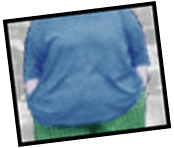07 July, 2007
Levitation is Easy
Ok, we've all had the "calories in = calories out" mantra shoved in our faces. We try to say "It's not as simple as that!" and we get hit back by a blast of "Fat people don't violate the laws of thermodynamics!" Sigh.
They are, of course, referring to the first law of thermodynamics about conservation of energy. The reasoning is that if your body stays the same weight, then the amount of energy coming into your body must be the same as going out, which they use to deduce that all you have to do is to make sure there's more calories going out than in, and presto! Weight loss occurs.
Well, it REALLY ISN'T THAT SIMPLE.
Really. In one sense, yes it is that simple and fat people don't break the laws of thermodynamics, but that simple mantra is way too simplified. Here's a metaphor to make it more obvious:
Levitating is easy!! Here's how. First stand up. Now take one leg off the floor so you're standing on one leg. Now take the other leg off the floor. You're levitating!
You're not? Don't give me those excuses!!! ALL YOU HAVE TO DO to levitate is KEEP BOTH LEGS OFF THE FLOOR. IT'S THAT SIMPLE, STUPID. As long as you keep both legs off the floor, you will levitate. What's that you say? Gravity? No, I don't want to hear a word about gravity, you're making it too complicated. It's really very simple. As long as you keep both legs off the floor, you will float in mid-air. Full stop.
Ok so we know the simple levitation recipe isn't as simple as it sounds because we know there is something else to consider: gravity.
In a similar way, the case of the "calories in = calories out" idea, also has other things to consider. Just because that equation holds doesn't mean you can apply it to the idea of weight loss. There are numerous factors affecting the energy that comes into a body, and numerous factors affecting what energy goes out again, and not all of them are under conscious control, in fact very few of them are under conscious control.
We have a fair amount of choice about what we eat, but we have no conscious control over how efficiently or inefficiently our bodies digest the food and how our bodies choose to store (or not) the fuel provided. We also don't have much control over when our bodies give us hunger signals and how strong/painful those signals might be. Depending on how strong the signals are, it may be very difficult to ignore those signals for a short while, let alone repeatedly over a long period of time.
We also don't have that much control over what energy goes out. Sure, we can choose to do exercise (at least up to a point of exhaustion), but if we try and do too much exercise on too little fuel then our bodies simply won't be able to do what we ask. We can have a small effect on our rate of energy expenditure when at rest, by building up bigger muscles, but that is still a small effect. We also don't have any control over what energy is excreted, nor what temperature our bodies choose to maintain us at.
And if we, in a futile determined attempt to have control over that energy balance, try and manipulate the energy in and out as much as we can, then our bodies' internal regulation systems alter themselves, adapting to the new conditions, to maintain the weight we currently are. If we try and expend more energy than we take in, our metabolisms get more efficient, our temperature lowers, our muscles waste away, we get ever stronger more painful signals telling us to EAT EAT EAT.
It may not be as obvious a force as gravity, but that doesn't mean the force of our bodies' internal regulation isn't powerful. Countless studies have shown that the vast majority of bodies have considerable resistance to long-term weight change, even when drastic measures like weight loss surgery are employed. The "calories in = calories out" mantra is, therefore, oversimplistic and unhelpful.
